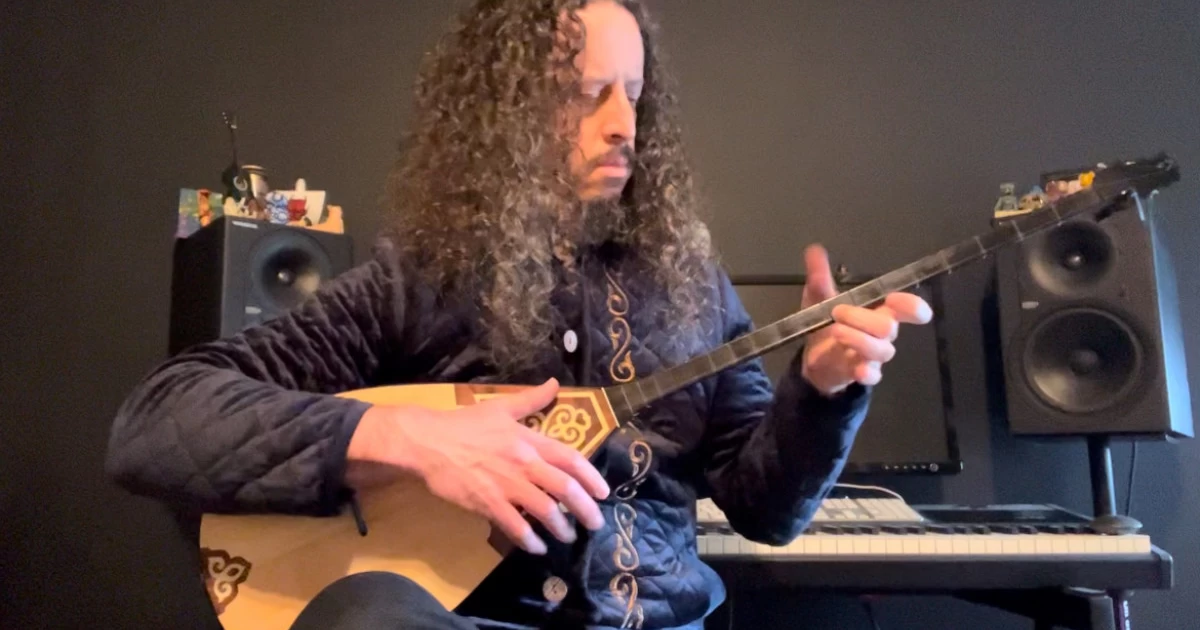
Many people on social networks write good wishes and thank Jeff Gersh, a New York resident, who masterfully performed the pieces “Erke Sylkym” and “Balbyrauyn.” Many are curious about how a professional guitarist and composer, who performed with various bands in America, became interested in playing the dombra. Initially, he learned to play the dombra through YouTube, then through Zoom. Last year, he specifically flew to Astana and for a week and a half took regular lessons from Aigerim Myrzakhmet, a teacher at the Dombra Academy. We talked to Jeff, who hopes to perform on stage in Kazakhstan in the future.
“There is a magic in the dombra that I can't explain.”
- Upon seeing the official page of the Dombra Academy showcasing your performance of the “Erke Sylkym” kui, it's hard to believe that just two years ago you first picked up the dombra.
- I wish I had heard the sound of such a wonderful instrument as the dombra not 2 years ago, but 20 years ago.
- Many who watched the video claim that you have a musical education. Are you a professional musician?
- Yes. I was born and have lived in New York all my life. I have been involved in music since I was 6 years old. The first instrument I touched was the piano. Then, at 11, I became interested in the guitar. That was when I realized my future was in music. As a child, then in school, and later in college, I was deeply interested in music. I performed in different bands. In college, I started exploring the music of other cultures. After becoming a guitarist, I developed a keen interest in string instruments, particularly national instruments like the Japanese shamisen and the African kora. I hadn't yet discovered the dombra. I might have heard its sound somewhere but didn’t recognize it as a distinct instrument. Back in 1999-2000, my focus was on the shamisen. As I grew older, I played different styles of music and composed music for films, often providing live accompaniment for silent films. Seven years ago, while browsing YouTube, I stumbled upon an unusual video. You know, when you go on YouTube looking for something, one video leads to another, and eventually, you find something else that catches your interest. In the video I found, four musicians were performing in a large concert hall, seated on chairs with the orchestra behind them.
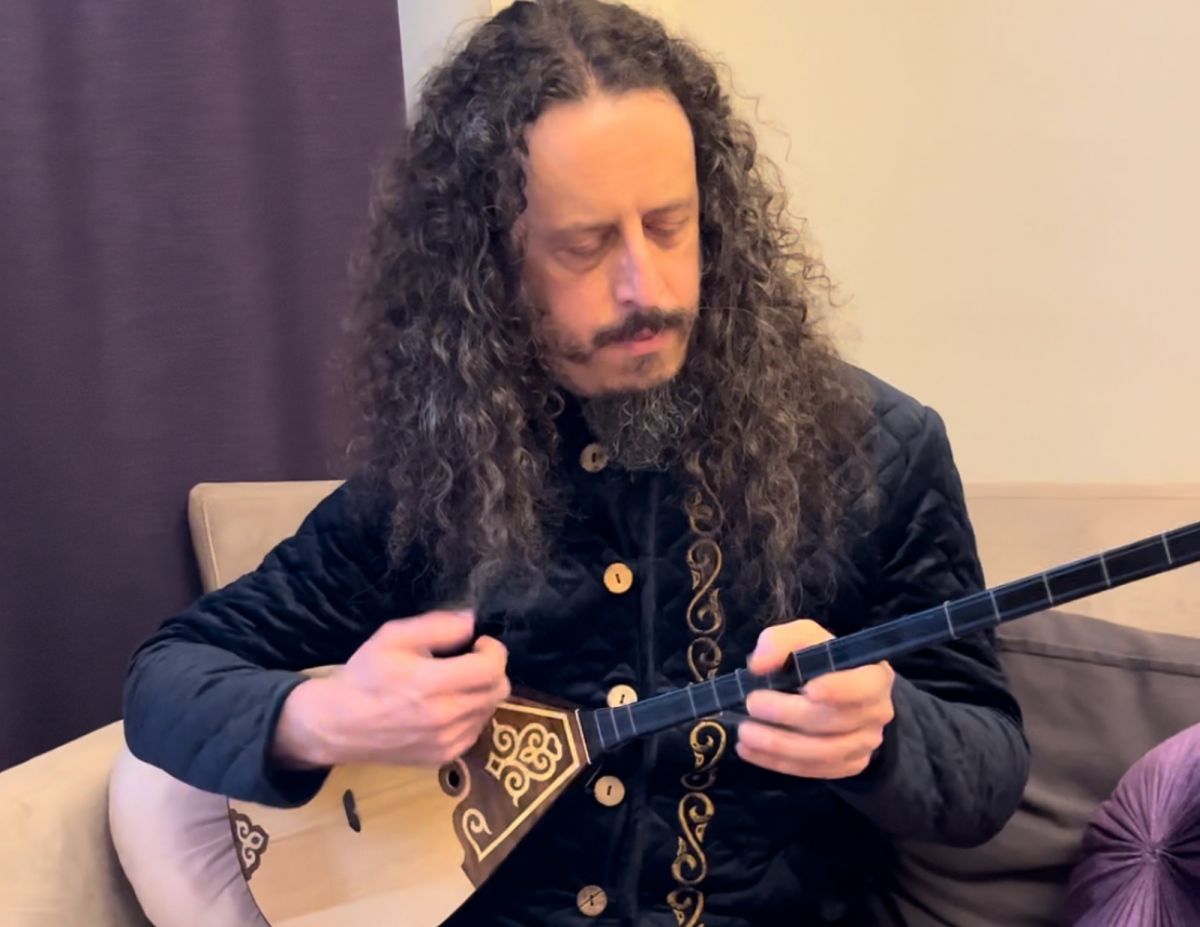
- Yes, this is a performance that has gathered more than a million views.
- Each of them played his part of the kyui on the dombra, and at the end, they all joined together with the orchestra. I was amazed when I saw this video. I had never heard anything like it before. The booming and powerful sound coming from an instrument with only two strings surprised me. As a musician studying string instruments, I wondered why I had never encountered the dombra before. I remember thinking, ‘I need to learn how to play this instrument. I need to find this instrument immediately.’ It was a challenge for me and very intriguing. I knew a woman named Nurshat who lives in New York. I mentioned my interest in a new instrument - the dombra. One day, she told me she was visiting her relatives in Kazakhstan. I asked if she could bring back a dombra, if it wasn’t too much trouble. Without hesitation, she brought me a dombra from Kazakhstan. Then, I started searching on YouTube for instructional videos on how to correctly play the dombra. I found the Nar Agashy kui and learned it by myself in a few days. ‘What next?’ I wondered, since there were almost no tutorial videos on the internet on how to perform kui. I set the dombra aside and didn’t touch it for a long time, although I occasionally checked YouTube to see if anyone had uploaded a tutorial video. Finding nothing, in 2020 I subscribed to the Instagram pages of several dombra players and observed from the sidelines. This inspired me to seriously learn to play the dombra, as the videos they uploaded reignited the emotions I felt when I first heard the dombra's sound. I thought about contacting one of these dombra players for online lessons, but I lacked the courage to write to them. Meanwhile, a musician named Aigerim, who teaches dombra in Kazakhstan, followed my page. We started corresponding. She inquired about my interest in Kazakh music. An amazing situation arose, because just at that time I was determined to learn to play the dombra at any cost and was looking for people from whom I could take lessons. It’s as if Aigerim sensed it.
- Call it a coincidence.
- Yes, I also told her. She was amazed. So, in March 2020, I started taking lessons from teacher Aigerim via Zoom. For two years I worked with her every week. Then last October, I took the dombra and went to Kazakhstan for more than two weeks. My main goal was to learn to play the dombra face-to-face with a teacher. In the first week, I visited the sights of Almaty. Then, naturally, I went to several concerts. I still can't forget the impressions from the first concert I attended in Almaty - the concert of Tursynai Alibekkyzy, who demonstrated the zhetigen instrument. In addition to playing the zhetigen, she plays the dombra masterfully.
During the concert, six dombra players came on stage and knelt on one knee on either side of Tursynai. Then all seven performed several kyuis at the same time. It was the most emotional moment that touched my heart! Because for the first time, I heard professional musicians play the dombra. Tears came to my eyes when I heard their performance. I can't describe it in words, but there is a magic in dombra that I don't know. You see, this tool has nothing to do with me. I am an American and have nothing to do with Kazakh culture.
However, every time I hear the sound of the dombra, I feel that there is something that captivates and attracts me to this instrument. Not only the sound of the dombra but also traditional Kazakh music in general does not leave me indifferent. I heard a lot of music, got inspired, and fell in love. I was very amazed! After this concert, my interest in learning to play the dombra increased even more. There was a special desire to speed up face-to-face classes. I visited the museum of musical instruments in Almaty. While I was there, I heard that there was a concert the next day. I was in a hurry to go to this concert. Along with dombra players, kobyz players also performed there. Standing there, I talked to a woman. She asked me why I came to Kazakhstan. I told her my situation and explained everything. After the concert, she introduced me to authorities in traditional music. Then she approached one of these musicians and asked what event I could go to in Astana (laughs).
The next day she invited me to watch a TV show that she was filming in the same museum. There, the dombra players gave interviews and then demonstrated their skills. I attended this show and had an unforgettable experience. I met a dombra player named Shamil Abiltaev and became friends with him. Moreover, at the end of the evening, I was asked to play the dombra and was featured in this show (laughs). There I met many kind and supportive people. All this exceeded my expectations. Then I went to Astana and stayed there for a week and a half. However, I was not able to be a tourist. Because I came from another part of the world just to take lessons; every day, I studied intensively with teacher Aigerim. Finally, I reached the day when I was able to play with the second dombra player at the same time (laughs). The thing is, you won't be able to play at the same time as the teacher when taking a lesson via Zoom.
Walking around Astana, I thought that America had grown old
- What surprised you most during your 2-week stay in Kazakhstan?
- First of all, the indescribable nature. I was lucky enough to visit beautiful places such as the Sharyn Canyon, Kolsai Lakes, and the Kara Gorge. Then I went up to the Medeu Skating Rink, which many admire. A perfect place! However, this is only a piece of Kazakhstan, a small part of what I have to see. I hope that I will come next year. I want to visit many places in the future. Another thing that surprised me was the nature of people. Every resident I met radiated kindness. Along my way, I met very responsive and open people. There is no doubt that I am delighted with the local cuisine. I ate a lot of horse meat. Speaking in general terms, I will not make a distinction: “I liked this” and “I liked this here.” I liked everything. By the way, I will say that I liked the character of the capital. Although I only went to Astana for classes, I found time and traveled to different places. I explored the old part of the city for five hours and then visited the national museum. I was surprised that the city was built in such a modern style. After what I saw, I wondered: Has America grown old? (laughs). Of course, each country has its own characteristics. There is no doubt that New York is a wonderful city. It is very different from Almaty and Astana. However, Astana has its advantages. There I went to a concert. We met members of the Nazarbayev University orchestra and played the dombra together. I had unforgettable impressions here. I was convinced that the dombra is highly respected in Kazakhstan. I have not seen any other country that would treat and value its national instrument so carefully. Even small children become masters of playing the dombra.
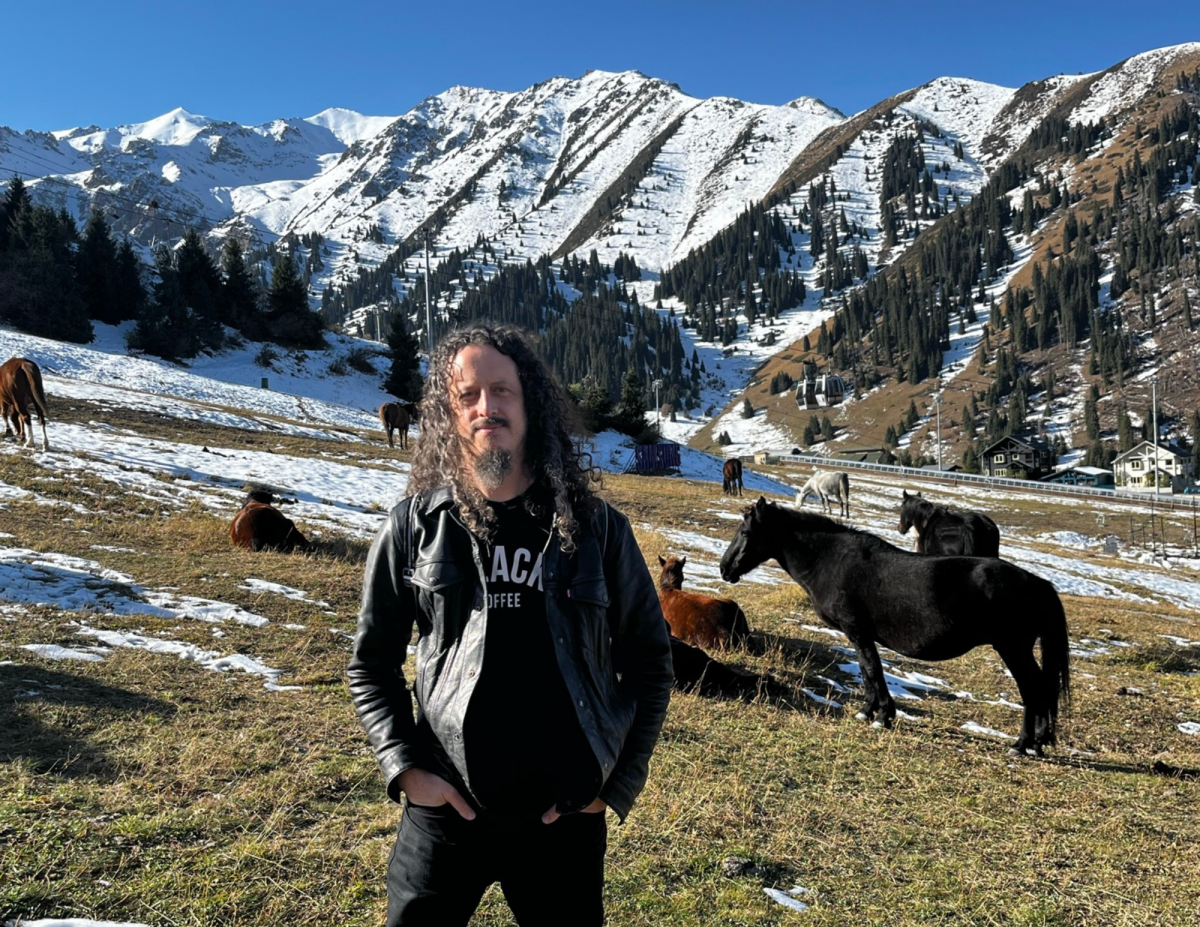
- We say: ‘A real Kazakh is not a Kazakh without a dombra.
- Yes, I understood that. This is incredible! I was amazed that a musical instrument could bring people together under one roof and showcase their culture in such a way. I can’t think of any other country in the world that has this characteristic. I was surprised to see that one instrument plays a significant role in the state and culture. I am incredibly glad that I became acquainted with such a special instrument, even though it was later in life. I try to study diligently until I gain enough experience. In fact, it is not difficult for musicians to learn an instrument from another country. However, they play it with their 'understanding.' In most cases, they do not spend time learning about the culture and music of the country where the instrument originated, nor do they put effort into studying the performance technique. It then becomes apparent that respect for the culture, the instrument, and the people of that country is diminishing. Since childhood, I have had respect for the cultures of other countries. I truly respect their music.
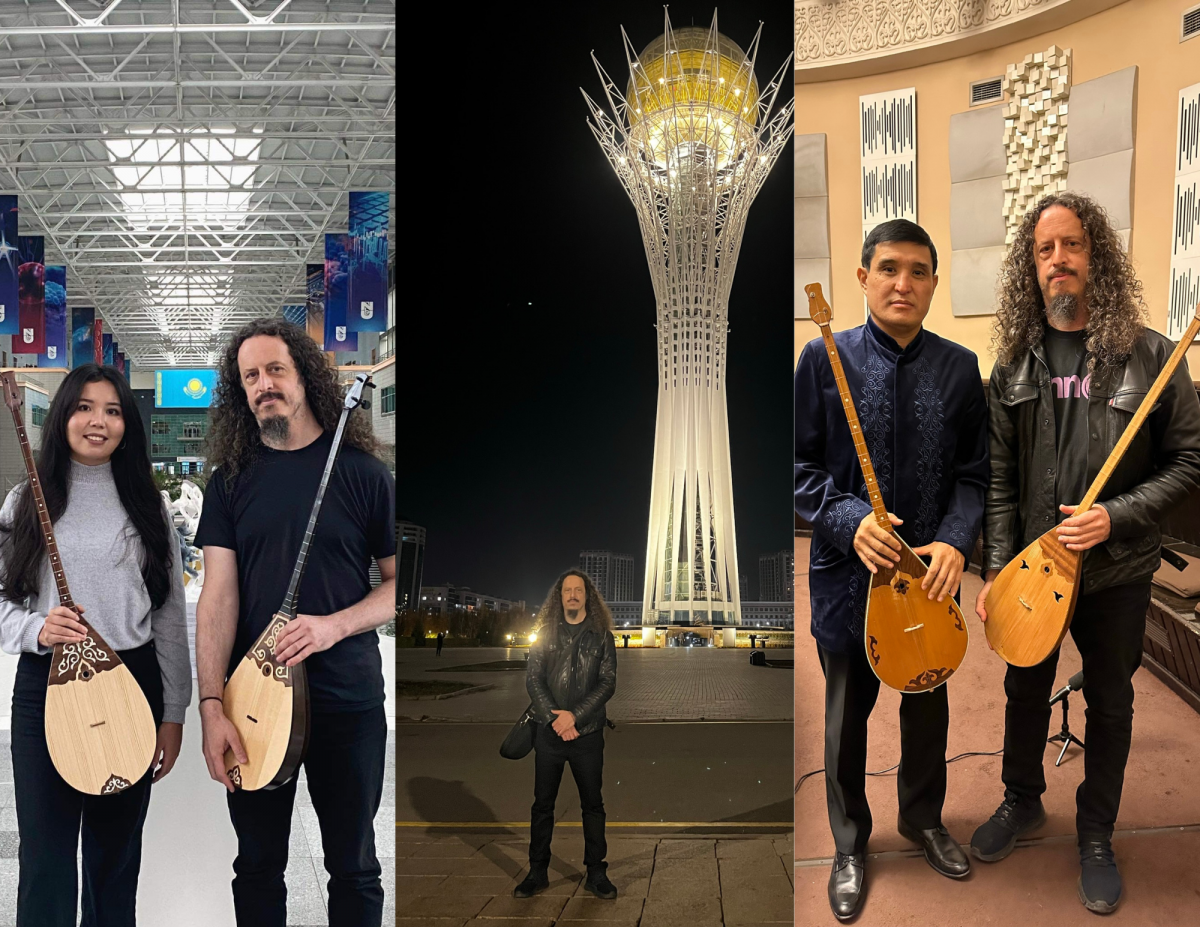
- How many pieces do you have ready to play now?
- Let me see. I keep a list. One, two, three, four… sixteen, seventeen. Yes, I can play seventeen kuis in total. Now I’m rehearsing the eighteenth. But the more kuis I learn, the faster I forget the first ones I learned. That's why I always practice them.
- I’m amazed that you learned all this in just two years.
- Yes. Once I became a professional guitarist, I quickly learned many parts. I got the hang of it right away. However, some techniques used on the guitar are not applicable to the dombra. I'm facing some technical difficulties. Moreover, the guitar is played with a pick, whereas the dombra must be played with your fingers. This aspect was new to me. However, gradually I got used to it. Compared to two years ago, my technique has improved somewhat.
Nevertheless, I still have a lot to learn. At the same time, I am extremely grateful to my teacher Aigerim, who introduced me to this wonderful instrument. She is very skilled, a wonderful person. During the lessons, it seems to me that I am doing everything correctly, but Aigerim notices minor details in my playing and constantly corrects me. She inspires me and wants me to become a professional musician. Of course, my innate musical talent helped me quickly learn to play the dombra. However, most of my current skills were acquired through this person. At least when I started studying online, I still didn’t know how it would turn out. Even though the online class was better than I expected, it is still better to learn face to face.'
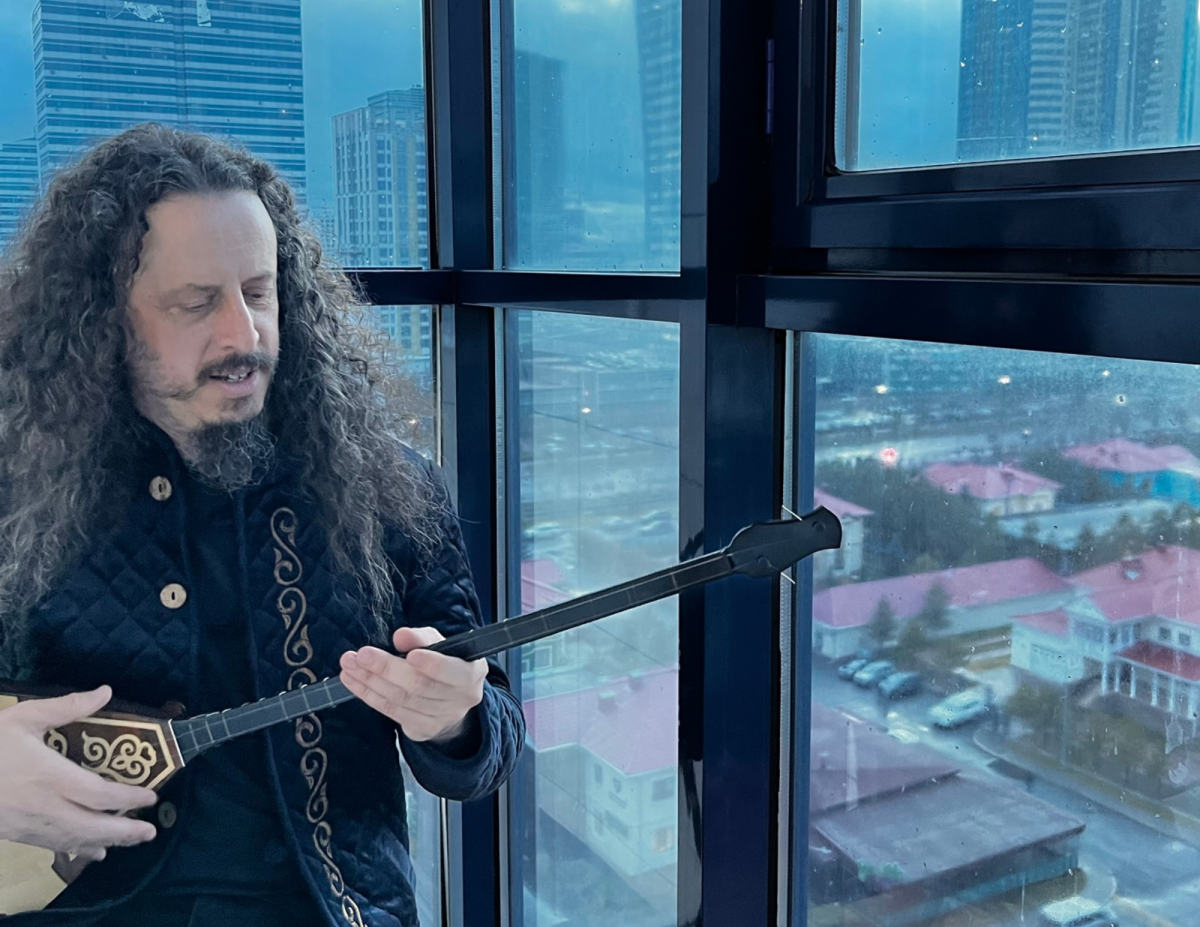
- What is the main goal of learning to play the dombra?
- My main goal is to play the dombra freely, like the Kazakhs do (laughs). And I want to play skillfully so that Kazakhs will appreciate it. I’m also planning to go to Kazakhstan and perform at a concert.
- But you are already playing like the Kazakhs. And we want to let you know that the Kazakhs welcome you warmly.
- Well, then I want to play there as a professional Kazakh musician (laughs). My dream is to perform solo and with an orchestra on the stages of Kazakhstan. Regardless of the music, no matter how long we have studied, there is still much we do not know. We cannot say, “I know everything, that’s it.” Therefore, I want to master some instruments and learn many kuis in the future. I also liked the different style. What is it called? Besides playing the dombra professionally, she sings beautifully. Maybe she’s singing a folk song or something? (Sends video of a performance by Saule Zhanabergenova).
- Traditional song.
- I want to learn the melody of this traditional song. True, I can’t sing, but I like the melody of these songs. I was amazed at how well this person played the dombra, in addition to singing for fun. In the future, I will start studying the music of traditional songs.
- Thank you for sharing your story! May your art thrive!
Interview by
Aliya TILEUZHANKYZY
translated by Qazalem